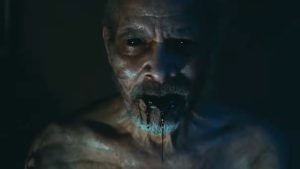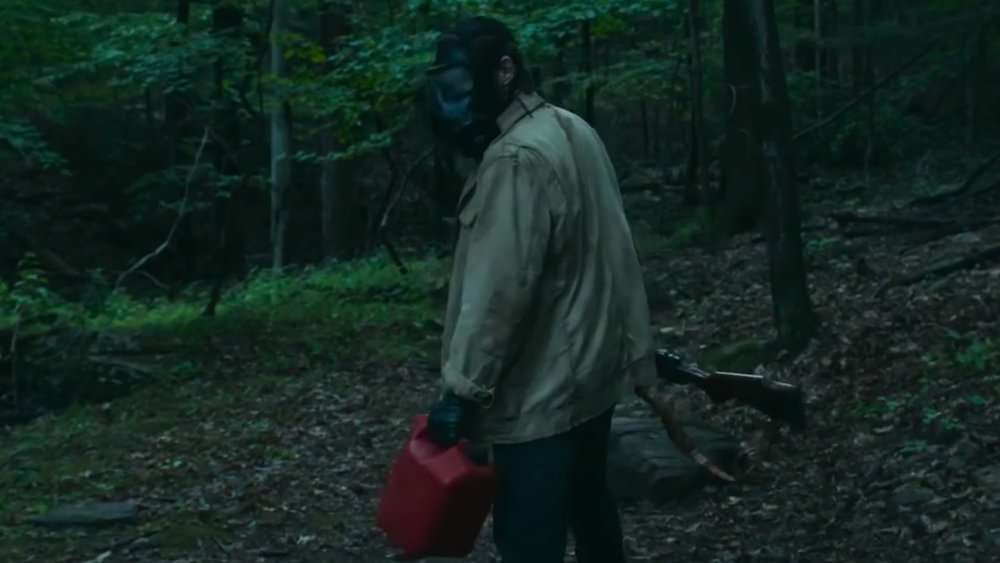I don’t think you mess with a family willing to mercy-kill grandpa. This happens in the opening moments of It Comes at Night. Plague-infected gramps has been relegated to the antechamber of the family’s remote cabin and after saying “goodbye,” Paul (Joel Edgerton), Sarah (Carmen Ejogo), and their son Travis (Kelvin Harrison Jr.) wheelbarrow the old man out back to a pre-dug hole where they shoot him and set the corpse on fire. This is what survival entails.
At this point in the narrative, this nuclear family might have just killed of 25% of the remaining population of the Earth. All we know is they’re alive and they’ve deliberately chosen a home miles from whatever has become of civilization. We think this trio is self-sufficient, but it’s hard to tell. They do have water, which is a huge luxury if you plan to live forever in the forest. It was hard not to feel sorry for teenage Travis; it’s one thing if he ruined his future with bad grades, drug abuse, or a shoddy work ethic. He’s 18 and there’s nothing for him in life but to grow up alone and paranoid which manifests itself in an overdeveloped affliction of insomnia.
The insomnia comes in handy, however, when Travis realizes somewhere around 2 a.m. that someone or some thing is breaking into their house. Up until this moment, it’s impossible to tell whether the horror in It Comes at Night is of the paranormal variety. Was this a weird sequel to It Follows or some deliberate precursor to the new Stephen King adaptation, It? There’s an unspecific pronoun in the title for a reason, no?
Giving away what’s behind Door #2 a.m. seems exceptionally weak at this point despite there still being 80% of movie remaining, so I’m not going to do it. I will say that the strength of It Comes at Night is not derived from the paranoia of the unknown, but instead the psychological fear of the known. In other words, this film is a horror, all right, but perhaps not the kind of horror I bargained for.
In less than a year, Joel Edgerton has become a leading spokesman for racial relations having been partnered aside Ruth Negga in the highly charged Loving and Carmen Ejogo in the anything but It Comes at Night. In the theater, it was hard not to smirk when some pissed-off horror-seeking redneck four rows down dawned comprehension that the white guy in the film was married to the black woman and promptly stormed out. You know what? Interracial marriage shouldn’t be a big  deal and in this film, it isn’t. The psychological torture within the screenplay has nothing to do with the races of the players; personally, I found this facet refreshing.
deal and in this film, it isn’t. The psychological torture within the screenplay has nothing to do with the races of the players; personally, I found this facet refreshing.
It Comes at Night has no problem interrogating a doomed future. A lot of us enjoy post-apocalypse fiction, but few have asked, “Do you really want to live in a post-apocalyptic world? What are you living for?” Exactly what keeps you alive that is in no way related to the existence of fellow humans? The answer for me is “very little.” And like many deep films, It Comes at Night is a downer, but you must admit that deep horror films are very rare indeed, not unlike a life-crippling virus.
“I want to see a horror film”
“What kind of horror film?”
“Something scary … something recent”
“It Follows?”
“No it doesn’t. Most scary films are way old. I want something new, scary and maybe psychological.”
“You want to see It?”
“Yeeeeessss, I was hoping you could name a title or two to watch when our new TV arrives today.”
“It Comes at Night?”
“Gosh, I hope not. I can’t wait to check out the new screen. See how there’s all this background noise on the one I own?”
“Hush? Don’t Breathe?”
“Oh, can you tell the problem just by listening? No matter; I’m getting a new set anyway. That’s why I brought the old one to you.”
“Split? Get Out?”
“Ok, But really just wanted a recommendation. I didn’t think it was too much to ask.”
Rated R, 91 Minutes
D: Trey Edward Shults
W: Trey Edward Shults
Genre: Our screwed future
Type of person most likely to enjoy this film: Survivalists
Type of person least likely to enjoy this film: Extroverts



